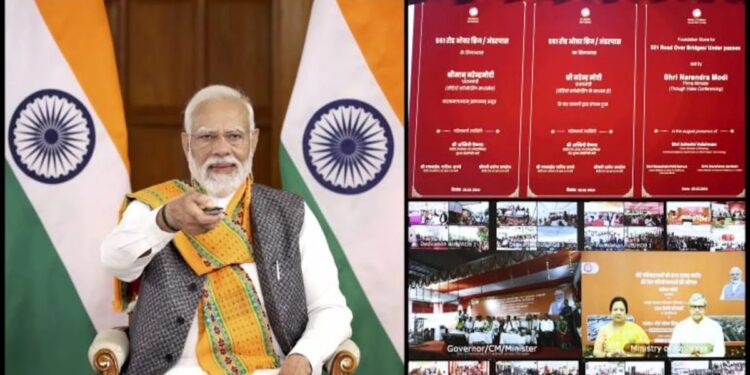After nearly five decades, Sikkim, Bharat’s only State without railway access, marked a historic milestone as Prime Minister Narendra Modi inaugurated the foundation stone-laying ceremony for the maiden railway station in Rangpo.
The ceremony took place amidst the launching of over 2,000 rail infrastructure projects valued at approximately ₹41,000 crore, signifies a monumental leap for the Northeastern State, which became Bharat’s 22nd State on May 16, 1975, following the abolition of its monarchy.
In a virtual address, PM Modi mentioned the design of the Rangpo railway station would pay homage to Sikkim’s rich cultural heritage and architectural legacy.
The event, held at Khanikola in Rangpo and attended by Sikkim Governor Lakshman Prasad Acharya, was hailed as a pivotal moment in the State’s journey towards development, aligning with the vision of Viksit Bharat@2047 and promising to strengthen the tourism sector by providing efficient and expedited travel options.
Governor Acharya underscored the railway’s significance, specifically during the monsoon season when disruptions along NH-10 are common, noting that the new infrastructure would enhance connectivity and reliability for residents and visitors alike.
The Rangpo railway station forms part of the ongoing construction of a 45-kilometer rail line connecting Sivoke near Siliguri in West Bengal to Rangpo in Sikkim. With 14 tunnels and 22 bridges planned, the project initiated in October 2009, aims to facilitate smooth transportation, with trains capable of reaching speeds of up to 110 kmph and the ability to handle 25-ton loads.
Additionally, the line will feature Bharat’s potentially first underground halt station at Teesta Bazar, in high altitude and semi-mountainous terrain. The line will have four open crossing stations (Sivok, Riyang, Melli, Rangpo).
According to project director Mohinder Singh, while the majority of the track falls within West Bengal, a crucial portion spans three and a half kilometers in Sikkim.
Despite initial delays, attributed to factors such as cost revisions and extended deadlines, the project, awarded to IRCON International in May 2010 at an estimated cost of ₹4,084.69 crore, is now slated for completion by December 2024, with a revised budget of ₹12,474.07 crore.
Alipurduar Deputy Railway Manager Amarjeet Agrawal accentuated the strategic importance of the Rangpo station from both touristic and defensive perspectives as the link will pass through Gangtok and Nathu La region, close to the China border. The project leads to a rail map to enhance Bharat’s defence preparedness at the Sikkim-China border, mainly against the backdrop of border tensions with China. It will ensure smooth movement of military logistics and cater to the rapid transfer of heavy military equipment and artillery, offering a major strategic advantage. It would significantly reduce the time taken for troop movement from one location to another, aiding swift actions in times of emergencies.
He highlighted the government’s phased approach to extending railway connectivity further into Sikkim, with plans for expansion to Gangtok and eventually Nathula in subsequent phases.
“The government has signed this project in three phases. In the first phase, Sivoke to the Rangpo rail project; in the second phase, from Rangpo to Gangtok; and the third phase, from Gangtok to Nathula,” added the official.

















Comments